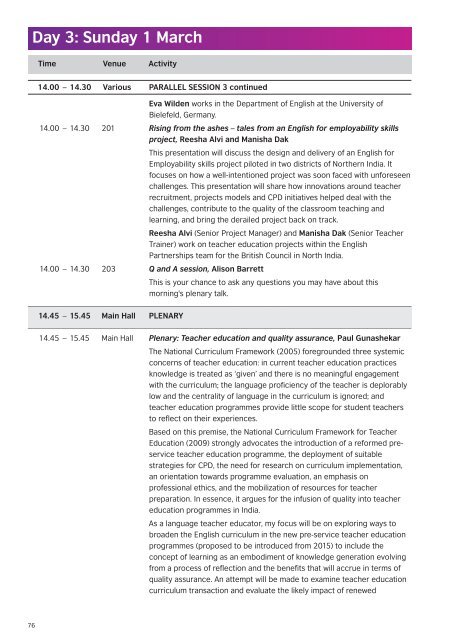tec_15_-_conference_brochure_low_res
tec_15_-_conference_brochure_low_res
tec_15_-_conference_brochure_low_res
Create successful ePaper yourself
Turn your PDF publications into a flip-book with our unique Google optimized e-Paper software.
Day 3: Sunday 1 March<br />
Time Venue Activity<br />
14.00 – 14.30 Various PARALLEL SESSION 3 continued<br />
Eva Wilden works in the Department of English at the University of<br />
Bielefeld, Germany.<br />
14.00 – 14.30 201 Rising from the ashes – tales from an English for employability skills<br />
project, Reesha Alvi and Manisha Dak<br />
This p<strong>res</strong>entation will discuss the design and delivery of an English for<br />
Employability skills project piloted in two districts of Northern India. It<br />
focuses on how a well-intentioned project was soon faced with unfo<strong>res</strong>een<br />
challenges. This p<strong>res</strong>entation will share how innovations around teacher<br />
recruitment, projects models and CPD initiatives helped deal with the<br />
challenges, contribute to the quality of the classroom teaching and<br />
learning, and bring the derailed project back on track.<br />
Reesha Alvi (Senior Project Manager) and Manisha Dak (Senior Teacher<br />
Trainer) work on teacher education projects within the English<br />
Partnerships team for the British Council in North India.<br />
14.00 – 14.30 203 Q and A session, Alison Barrett<br />
This is your chance to ask any questions you may have about this<br />
morning's plenary talk.<br />
___________________________________________________________________________________<br />
14.45 – <strong>15</strong>.45 Main Hall PLENARY<br />
___________________________________________________________________________________<br />
14.45 – <strong>15</strong>.45 Main Hall Plenary: Teacher education and quality assurance, Paul Gunashekar<br />
The National Curriculum Framework (2005) foregrounded three systemic<br />
concerns of teacher education: in current teacher education practices<br />
knowledge is treated as ‘given’ and there is no meaningful engagement<br />
with the curriculum; the language proficiency of the teacher is deplorably<br />
<strong>low</strong> and the centrality of language in the curriculum is ignored; and<br />
teacher education programmes provide little scope for student teachers<br />
to reflect on their experiences.<br />
Based on this premise, the National Curriculum Framework for Teacher<br />
Education (2009) strongly advocates the introduction of a reformed p<strong>res</strong>ervice<br />
teacher education programme, the deployment of suitable<br />
strategies for CPD, the need for <strong>res</strong>earch on curriculum implementation,<br />
an orientation towards programme evaluation, an emphasis on<br />
professional ethics, and the mobilization of <strong>res</strong>ources for teacher<br />
preparation. In essence, it argues for the infusion of quality into teacher<br />
education programmes in India.<br />
As a language teacher educator, my focus will be on exploring ways to<br />
broaden the English curriculum in the new pre-service teacher education<br />
programmes (proposed to be introduced from 20<strong>15</strong>) to include the<br />
concept of learning as an embodiment of knowledge generation evolving<br />
from a process of reflection and the benefits that will accrue in terms of<br />
quality assurance. An attempt will be made to examine teacher education<br />
curriculum transaction and evaluate the likely impact of renewed<br />
76


